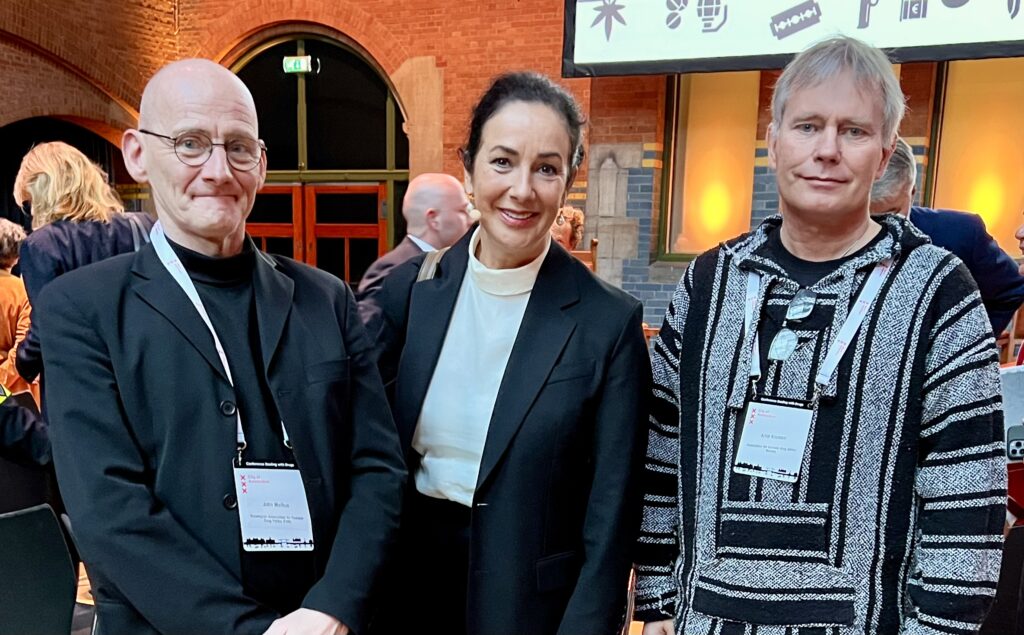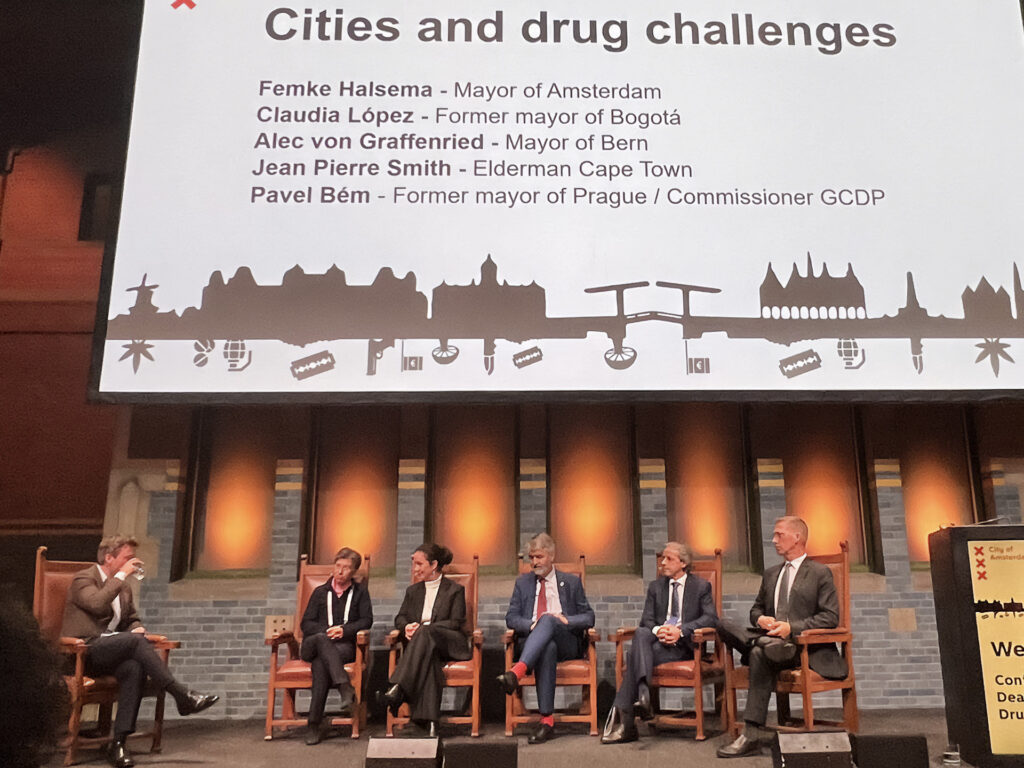
Drugreporter February 02. 2024: A New Wind is Blowing in the Drug Debate, by Arild Knutsen, leader of The Association for Humane Drug Policy.
It seems that a new wind is blowing in the drug policy debate. With new, surprisingly high-pitched voices promoting a narrative previously considered rather hippie-like. They don’t quite know how it will end but are clear about fundamentally changing course. An article by Arild Knutsen, leader of the Association for Humane Drug Policy, Norway.
In September 2023, the UN High Commissioner for Human Rights published a report on human rights in drug policy. The report was written at the behest of the Human Rights Council, to contribute to the midterm assessment of the Ministerial Declaration of 2019.
The report is the most ambitious and comprehensive UN document to date and aims to adapt drug policy to human rights. It is also an international milestone, representing the first time a UN body broke the taboo and recognized that legal regulation of drugs is a legitimate approach to improving public health, strengthening human rights and fighting organized crime.
At an international drug reform conference in Arizona in November, UN High Commissioner Volker Türk made a groundbreaking speech, declaring that drug use has taken many lives, but even more lives have been damaged or lost due to poorly framed drug policies. Türk pointed out the constant emergence of new evidence confirming that criminalization and the “war on drugs” has curbed neither access nor demand.
The report reveals that criminalization contributes to stigma and social exclusion and is the most important obstacle to people seeking treatment. In addition, the battle of several authorities against the production and distribution of illegal drugs in the so-called “war on drugs” has been heavily militarized in recent years, with the sharply escalating resort to lethal violence in several countries.
There are also increasingly serious violations of human rights in the fight against drug users, like the use of disproportionate force, arbitrary detentions and extrajudicial killings. The number of people executed for drug offenses doubled between 2021 and 2022. And this does not include countries that keep the number of executions secret.
On all parameters, the development is proceeding in a negative direction; however, Volker Türk expressed relief that more and more countries are beginning to treat drug problems as a public health issue by introducing knowledge- and human rights-based approaches and decriminalizing drug use.
Volker Türk also advocated measures to control the drug market through responsible regulation, to eliminate the profits from illegal trade, crime and violence.
Both supply and demand are growing in Europe. Last year, more cocaine was seized in Norway than in the last 22 years combined. There has also been a sharp increase in seizures and deaths due to nitazenes, a group of synthetic opioids significantly stronger than heroin.
There is a constant escalation of violence, bombings and killings connected with drug gangs in countries like Sweden, Belgium and the Netherlands.
Now Amsterdam’s Mayor Femke Halsema advocates regulating the drug trade to free it from criminals’ hands, for example by prescribing cocaine or selling ecstasy at festivals.
In early January, Halsema wrote thus in a debate article in the British newspaper The Guardian: ” As a result of globalization and the international criminalization of drugs, the trade in illegal drugs has become more lucrative, professional and ruthlessly violent. The effects have been catastrophic. The war against drugs is both counterproductive and pointless”.

On Friday, January 26, we, a delegation from the Association for Humane Drug Policy, participated in the conference on Dealing with Drugs – The Quest for Regulation, which Halsema organized in Amsterdam. Both current and former mayors from several cities and several international drug policy actors were among the initiators. Halsema launched a manifesto advocating the regulation of drugs, which all the guest presenters signed. A diverse coalition of administrators, policymakers, scientists, and civil society representatives are thus united in creating a more humane drug policy. (You can watch the conference video here.)
Halsema’s position naturally arouses attention and has received extensive coverage in the press. The Dutch Minister for Climate and Energy (currently Minister of Finance), Rob Jetten, fully supports Halsema, while Justice Minister Dilan Yesilgöz stated the day before the conference that the topic was a non-issue.
Yesilgöz did not attend the conference either, but the Dutch Ministry of Justice was well represented with Femke Halsema declaring to a packed hall that regulating drugs was the only way to crack down on organized crime and reduce the social and health costs.
Claudia Lopez, who just finished a four-year term as the Mayor of Bogotà, Colombia, also attended the conference. Few countries have been exposed to so much corruption, violence and murder as Colombia, as a result of the drug war and Lopez warned that European countries could face the same fate as Colombia if they did not fundamentally change course.
(Colombia was among the countries changing course which Türk singled out in his speech. In October, Colombia’s authorities announced a new drug policy that explicitly recognizes the international guidelines for human rights, with a focus on public health, the environment and development).
The current Mayor of Bern, Alec Von Graffenried, another presenter, alerted the audience to the real danger of several European countries ceasing to be democratic nations and ending up as narco-states. The Swiss capital is now in the process of preparing a pilot for the regulation of cocaine, due to the use of crack (crystallized cocaine) having exploded on the streets in the past year.
Femke Halsema told the assembly about the recent murders that have shaken the country, committed by young people from poor backgrounds for such large sums that only drug lords can afford to offer. Several presenters pointed out that police efforts against market players are counterproductive, at all levels, under the current conditions. If you knock out a group in the drug market, new ones are ready to take over immediately. Halsema highlighted, among other things, the seizure of tons of cocaine in recent years, including in container ports, while the supply is only increasing and the prices are falling.
Neil Woods, a former English police detective, narrated movingly about how he had infiltrated a drug network for seven months and was now suffering from trauma, having been threatened with both knives and firearms. The action ended with the arrest of over 50 people, including the leaders of the gang. The police thought they had cleared an entire city of illegal drugs, only to find the supply back to the same level after just two hours.
Woods is a board member of the Law Enforcement Action Partnership (LEAP), which, inter alia, fights for the treatment of trauma with psychedelics. Imagine that! Said Woods, “Cops are now fighting for treatment with illegal drugs, after being traumatized during the fight against them.“
Jindrich Voboril, the leading coordinator for public health and social services in the Czech Republic, also delivered a fiery speech against the prohibition policy. I asked him after the lecture how the present mayors and he, who has the highest responsibility on behalf of his country’s authorities, could say such things, which are so often dismissed as irresponsible drug liberalism. He explained that it is, on the contrary, pragmatic.
– We who are here represent societies that cannot afford to bind ourselves blindly to ideologies. What is important to us is whether the policy works. It is of no use to us that the police brag about the amount of seizures or the number of arrests when it turns out that the effect in this area is both catastrophic and extremely expensive. Then we have to look for other solutions.
Arild Knutsen
Association for Humane Drug Policy, Norway
On the featured image: Amsterdam’s Mayor Femke Halsema, with Arild Knutsen and John Melhus from the Association for Humane Drug Policy, Norway.
Read the article at Drugreporter here.